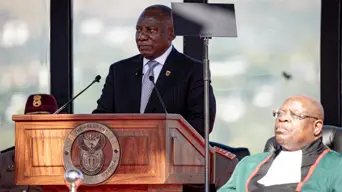
South African President Criticizes Democratic Alliance's Withdrawal from National Dialogue
South African President Cyril Ramaphosa has expressed strong disapproval of the Democratic Alliance's decision to withdraw from the country’s national dialogue. His remarks highlight a deep sense of betrayal and frustration, as he views the party’s actions as contradictory to its stated principles.
The president described the Democratic Alliance's withdrawal as an example of "the worst form of hypocrisy." He pointed out that the party had previously signed on to a document supporting the national dialogue, only to later criticize the very same issues they had agreed upon. This, according to Ramaphosa, reflects a lack of commitment to the core values of inclusivity and democracy that the Democratic Alliance claims to uphold.
The Importance of People-Led Dialogue
Ramaphosa emphasized that the national dialogue is not just about political parties but is meant to be a platform for all South Africans. He highlighted that the initiative was driven by the people, including churches and ordinary citizens, who have long called for a discussion on the future direction of the country. He stressed that the dialogue aims to bring together individuals from all walks of life, with political parties playing a minimal role, similar to how other groups like sports teams or cultural delegations would participate.
The president argued that the Democratic Alliance’s withdrawal represents a failure to align with the will of the people. He believes that by stepping away from the dialogue, the party is distancing itself from the broader South African population and undermining the very principles it claims to support.
A Historical Perspective
To illustrate the significance of the national dialogue, Ramaphosa referenced historical examples such as the drafting of the Constitution and the Freedom Charter. He noted that both were outcomes of inclusive processes involving the people of South Africa. The Constitution, in particular, was shaped by broad-based input, reflecting the aspirations of the nation. Similarly, the Freedom Charter, which laid the foundation for the current Constitution, was created through a collective effort of those who envisioned a democratic South Africa.
He also mentioned the role of international movements, such as the anti-apartheid movement in Austria, which supported the ideals of the Freedom Charter. These efforts were rooted in the belief that the people themselves should govern and that human rights must be respected.
What Will Be Discussed?
Ramaphosa outlined the key topics that will be addressed during the national dialogue. These include the state of human rights in South Africa, the country’s governance structure, and the path for economic growth. Additionally, the dialogue will cover cultural, sporting, and scientific issues, ensuring a comprehensive approach to shaping the nation’s future.
He expressed disappointment that the Democratic Alliance is missing out on what he calls “the biggest show in South Africa.” The party, which claims to represent a significant portion of the population, is denying its supporters the opportunity to contribute to the country’s future.
Reactions and Contradictions
The president also mentioned former President Thabo Mbeki, who reportedly wrote a detailed letter expressing concern over the Democratic Alliance’s behavior. Mbeki, along with many South Africans, is reportedly appalled by the party’s actions, particularly when it comes to their stance on good governance.
Ramaphosa found it perplexing that the Democratic Alliance chose to stay within the government of national unity while simultaneously boycotting the people of South Africa. He called this contradiction “strange” and questioned the logic behind such a decision.
Commitment to the Dialogue
Despite the Democratic Alliance’s withdrawal, Ramaphosa remains committed to moving forward with the national dialogue. He emphasized that the process will continue without interference from the party, and he is confident that it will be successful. He believes that the dialogue is essential for the country’s progress and that the voices of all South Africans must be heard.
In conclusion, the president’s remarks underscore the importance of unity, inclusivity, and adherence to democratic principles. He sees the national dialogue as a vital step toward addressing the challenges facing South Africa and ensuring a brighter future for all its citizens.
Post a Comment